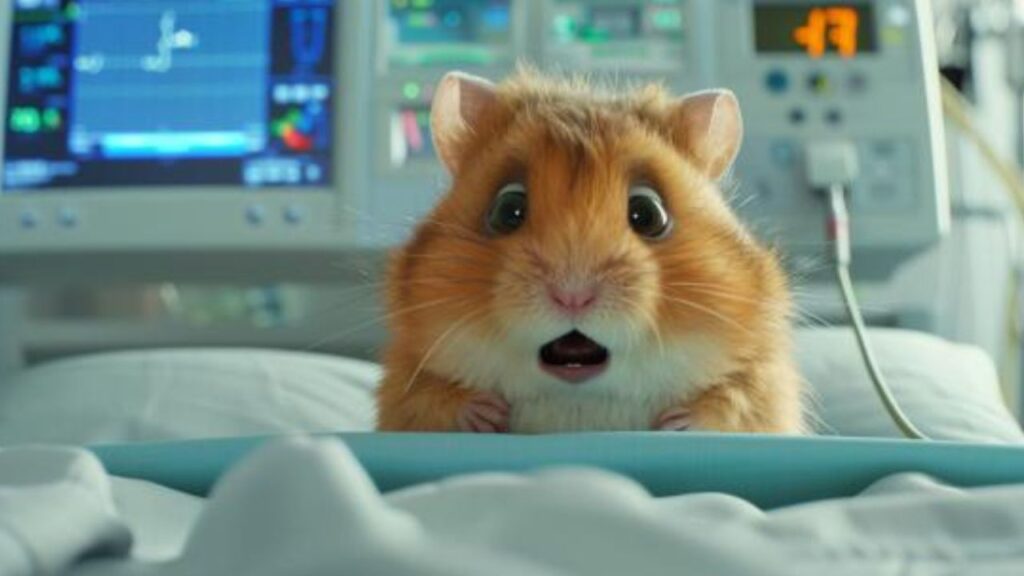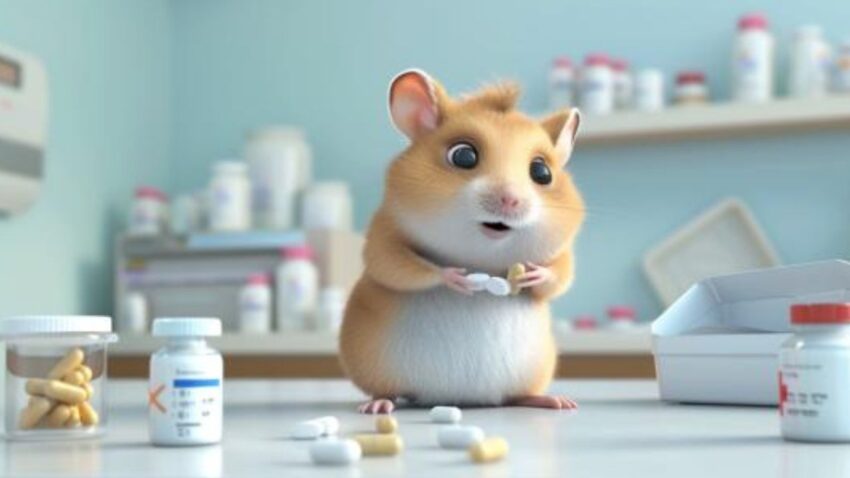Oh, my dear hamster enthusiasts and cherished caretakers of these tiny, whiskered bundles of joy! It’s your ever-loving Granny SnuggleSnacks, here to sprinkle a bit of wisdom and warmth into your day, especially when it comes to the well-being of our furry family members. Today, we’re going to cozy up with a topic that’s as vital as it is intriguing: the digestive health of our beloved hamsters. So, grab a cuppa, make yourself comfy, and let’s nibble away at the essentials of keeping those tiny tummies happy and healthy!
Introduction to Digestive Health in Hamsters
Just like in us humans, a healthy digestive system in hamsters is the cornerstone of overall well-being. It’s not just about breaking down food; it’s a complex dance of nutrients being absorbed, energy being produced, and waste being properly eliminated. When this system is in harmony, your hammy flourishes – sporting a shiny coat, bright eyes, and all the energy of a bustling little explorer. But if this balance tips? Oh, my dear, that’s when we need to step in with a helping hand (or paw).
Common Digestive Issues in Hamsters
Now, our fluffy friends can sometimes face a bit of a tummy turmoil. Diarrhea, constipation, and bloating can all signal that something’s amiss in their tiny digestive tracts. Often, these issues can stem from stress, dietary changes, or the introduction of unsuitable foods. It breaks my heart to see any little one suffer, so keeping an eye out for these signs is crucial.
Role of Diet in Hamster Digestive Health
Here’s where we, as devoted caregivers, can wield our greatest power: through the diet. A well-thought-out menu can do wonders for preventing those pesky digestive issues. High-quality pellets, a balanced mix of fruits and veggies (in moderation, mind you), and the occasional treat not only keep mealtime exciting but ensure our hamsters get the nutrients they need. But, the pièce de résistance in our arsenal? Probiotics, my dear friends, which we’ll delve into with all the enthusiasm of a hamster discovering a new toy.
In the grand tapestry of hamster care, understanding the nuances of their digestive health is akin to mastering the art of a perfect snuggle – it requires patience, love, and a little bit of knowledge. As we venture further into the world of probiotics, remember: that every little bit of care we pour into their lives comes back to us in heaps of joy and affection. So, stay tuned, dear hearts, as we embark on this journey to ensure the tummies of our tiny companions are as happy as they can be!
What Are Probiotics?

Gather ’round, my dear hamster guardians, as Granny SnuggleSnacks delves into the magical world of probiotics, those tiny but mighty heroes of the digestive realm. Just like a spoonful of love can make any dish taste better, a dose of probiotics can do wonders for your hamster’s digestive health. So, let’s unravel the mystery of these beneficial bugs together, shall we?
Definition and How They Work
Probiotics, my dear friends, are live microorganisms—often referred to as “good” bacteria—that reside in the digestive tract. Think of them as the gentle guardians of the gut, ensuring everything runs as smoothly as a well-oiled wheel. When introduced into the body in adequate amounts, they help maintain the delicate balance of the intestinal flora, aiding in digestion, nutrient absorption, and fighting off the “bad” bacteria that might cause infections or diseases.
Types of Probiotics for Hamsters
Now, not all probiotics are created equal, especially when it comes to our tiny furballs. There are a few specific types that have shown to be beneficial for hamsters:
- Lactobacillus: This is a common variety often found in yogurt and other fermented foods. It’s great for keeping the gut’s pH balance in check and supporting a healthy digestive process.
- Bifidobacterium: Another friendly bacterium that can aid in breaking down food, absorbing nutrients, and fighting off harmful bacteria.
- Enterococcus faecium: Often included in high-quality pet foods, this probiotic can help strengthen the digestive tract’s barrier against pathogens.
Each type has its unique benefits, so a blend of different probiotics is often the best approach to support your hamster’s digestive health fully.
Benefits of Probiotics for Hamster Health
The inclusion of probiotics in your hamster’s diet can be a game-changer, dear hearts. Here are a few ways how:
- Improved Digestive Health: By maintaining the balance of gut flora, probiotics help prevent diarrhea and constipation, common issues in our little ones.
- Enhanced Immune System: A healthy gut contributes to a stronger immune system, making your hamster better equipped to ward off infections.
- Nutrient Absorption: Probiotics assist in breaking down food, ensuring your hamster gets all the vitamins and minerals it needs from its diet.
- Reduction in Gastrointestinal Upsets: They can help reduce the risk of gas, bloating, and other discomforts, keeping your hammy happy and active.
Embracing the power of probiotics means giving your furry friend the best shot at a long, healthy, and joy-filled life. And isn’t that what we all wish for our beloved pets? In our next chapter, we’ll explore how to weave these microscopic marvels into your hamster’s daily diet, so stick with me, dear ones, as we continue this wholesome journey together. With a sprinkle of knowledge and a dash of love, we’ll make every meal a banquet of well-being for our tiny companions!
Incorporating Probiotics into Your Hamster’s Diet

Oh, my cherished hamster caretakers, as we venture further into our journey of digestive delight, let’s tackle the nitty-gritty of introducing these benevolent bacteria, probiotics, into our hamsters’ diets. Just like knitting a cozy sweater for a chilly evening, adding probiotics to your hamster’s meal plan requires a bit of care and precision. So, let’s roll up our sleeves and get to it, shall we?
Safe Sources of Probiotics for Hamsters
First things first, we must identify where these probiotics will come from. Just like choosing the ripest, juiciest apple from the tree, selecting the right sources is key:
- Fermented Foods: Small amounts of fermented goods, such as plain, unsweetened yogurt, can be a good source. However, dairy can be tricky for some hamsters, so this should be introduced very cautiously and in tiny amounts.
- Probiotic Supplements: There are probiotic supplements formulated specifically for small animals. These can be an excellent way to ensure you’re providing the right strains and amounts of probiotics. Always opt for high-quality, pet-safe products recommended by veterinarians.
- Probiotic-Enriched Hamster Food: Some hamster foods come fortified with probiotics. Opting for these can provide a simple and safe way to incorporate probiotics into your pet’s diet.
How to Introduce Probiotics
Introducing anything new into your hamster’s diet should be done with the gentleness of a soft, summer breeze. Here’s how to ensure a smooth introduction:
- Start Small: Begin with a tiny amount of probiotic food or supplement. We’re talking a smidgen, dear hearts, no more than the tip of a teaspoon.
- Observe: Watch your hamster closely for any signs of digestive upset or allergies. Each hamster is a unique little universe, and what works for one might not work for another.
- Gradual Increase: If your hamster tolerates the initial introduction well, you can gradually increase the amount to the recommended dosage over a week or so.
Recommended Dosage and Frequency
Now, dosing is where things can get a bit tricky, as you don’t want to overdo it. Here’s a general guideline:
- Follow the Product Recommendations: If you’re using a commercial probiotic supplement or enriched food, stick closely to the recommended dosages on the package. Manufacturers formulate these based on extensive research.
- Consult with a Veterinarian: For the best advice tailored to your little furball’s specific needs, a quick chat with a vet can make all the difference. They can provide dosage and frequency recommendations based on your hamster’s health, age, and dietary needs.
Remember, dear ones, introducing probiotics into your hamster’s diet isn’t a race; it’s more of a gentle stroll through a verdant garden. The key is to observe, adjust, and proceed with love and care, ensuring your hamster reaps all the benefits these microscopic helpers have to offer.
Monitoring Your Hamster’s Health

Ah, my devoted hamster caregivers, as we wend our way through the twists and turns of ensuring our little ones’ tummies are as happy as a hamster in a pile of fresh bedding, let’s pause a moment. It’s time to chat about how to keep a watchful eye on our furry friends’ health, especially after introducing probiotics into their diet. Just like tending to a beloved garden, monitoring our hamsters requires observation, love, and a sprinkle of wisdom. Let’s delve into the signs of flourishing health, the caution flags to watch for, and some granny-approved tips for long-term vigilance.
Signs of Improved Digestive Health
After introducing probiotics to your hamster’s regimen, you might wonder, “How will I know it’s working?” Well, my dear, here are a few joyful signs to look for:
- Consistent Stool: Their droppings should be firm and consistent in size. Think of them as little, healthy badges of honor.
- Active Appetite: A hamster with a happy gut will have a good appetite, eagerly exploring their food bowl like a treasure hunter.
- Energetic Behavior: Improved digestive health often leads to more energy. So, if your hamster seems more playful or curious, it’s a good sign.
- Healthy Weight: Maintaining a steady, healthy weight is another positive indicator. Not too chubby, not too slim – just perfect.
Potential Side Effects and When to Consult a Vet
While probiotics are generally safe, every hamster is a unique individual with their own sensitivities. Here are a few signs that it might be time to pause and consult your vet:
- Diarrhea or Constipation: If you notice any significant changes in their stool, especially after introducing probiotics, it’s time to reassess.
- Lethargy: A sudden drop in energy or interest in their surroundings could indicate that something’s not quite right.
- Appetite Changes: A decrease in appetite is a clear signal that your hamster may not be feeling their best.
- Weight Fluctuations: Rapid weight loss or gain is a cause for concern and warrants a professional opinion.
In any of these situations, it’s better to err on the side of caution and reach out to a veterinarian for advice.
Long-Term Health Monitoring Tips
Ensuring the ongoing well-being of your hamster involves more than just a keen eye; it requires a heart full of devotion. Here are a few tips to keep you on the right track:
- Regular Vet Check-ups: Just like us, hamsters benefit from regular health check-ups. These can help catch any potential issues early.
- Diet Diary: Keeping a diary of your hamster’s diet, including any probiotic introductions and their effects, can be incredibly helpful, especially during vet visits.
- Observation Routine: Make a habit of observing your hamster’s behavior, appetite, and stool regularly. Changes in any of these can be early indicators of health issues.
- Weigh-Ins: Regularly weighing your hamster can help you monitor their weight for any significant changes, ensuring they stay within a healthy range.
My dear friends, as we journey together in the care of our adorable hamster companions, remember that every little detail matters. From the first introduction of probiotics to the daily joy of seeing them thrive, your attention and love are what make all the difference. Armed with a bit of knowledge and a lot of love, we’ll ensure our furry friends lead the happiest, healthiest lives possible. Keep those spirits high and those observations keen!






